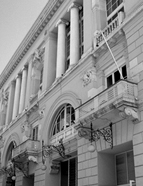

................................
. The SGL's 1895 statutory reform reflected its greater resource availability and the reorientation of its social purposes towards “demonstrating Portugal’s place in the history of civilisation, particularly in the history of geography, navigation, and commerce, as well as the historical assertion of its rights and its independent and sovereign individuality” (Art. 2, No. 2). Accordingly, the SGL undertook to ensure: the publication of scientific works, particularly through a Bulletin (published from 1876); the organisation, conservation, and development of a Library and "museums and collections of objects of scientific, industrial, commercial, artistic, and commemorative interest"; participation in, cooperation with, and representation at national and international congresses; public commemoration of events or individuals who had honoured science and the nation; and the granting of awards and honorary distinctions, among other activities (Article 3). The SGL's organisational structure revolved around the following "bodies of study and consultation": the Central Commission on Geography (CCG, established under the 1880 decree); five general committees (African, American, Asian, Insular, and Emigration); and twenty-seven professional sections covering various scientific domains such as arts and humanities, exact sciences, natural sciences, social sciences, and military sciences, among others (cf. Articles 33 to 38). Article 5 of the 1895 general statute stipulated that the objectives of the SGL excluded "any purposes, discussions, and manifestations of partisan politics, religious controversy, and matters of interest or competence exclusive to other institutions." The principle of political impartiality was always declared a central value of the SGL's structure, despite its explicit position on colonial policy. Between 1875 and 2014, the SGL was presided over by twenty-two members, some of whom had recognised political careers and hailed from the following professional fields: the military (notably the navy), law, and science/higher education. For the admission of members, the SGL originally required candidates to demonstrate dedicated study and specialised knowledge of "geographical and related sciences" or to have contributed to their advancement. The 1895 statutes defined five categories of membership: founding members (while they lasted); ordinary members (with a monthly fee of 20$00); corresponding members (who, through their studies, correspondence, donations, and/or personal influence, contributed to the aims and development of the SGL); donor members (individuals who had made or pledged significant donations of works, documents, scientific material, funds, goods, or objects of practical or social utility); and honorary members (individuals who had rendered outstanding services "to Science, the Nation, or the Society, in scientific research and particularly in geographical exploration, the defence and advocacy of Portugal's rights, or the enhancement of the Society")—cf. Articles 15 to 23. By 1894, the SGL had approximately 1,600 members, along with 8 honorary members (African explorers).
This work is financed by national funds through FCT - Foundation for Science and Technology, I.P, in the scope of the projects UIDB/04311/2020 and UIDP/04311/2020.
